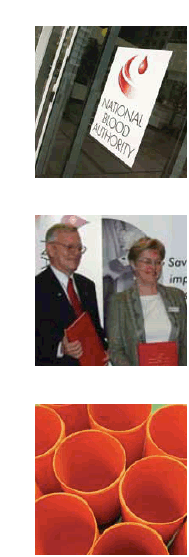1.4 National Blood Authority Board Member biographies
Mr Garry Richardson, Chair
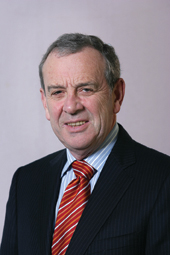 Mr
Garry Richardson is the Chair of the National Blood Authority
Board. His term as the Commissioner of the Private Health Insurance
Administration Council expired on 20 July 2007. Mr Richardson is
also the Independent Chair of Health Super Pty Ltd in addition to
holding the position of Independent Chair of the Audit Committee
for Stonnington City Council.
Mr
Garry Richardson is the Chair of the National Blood Authority
Board. His term as the Commissioner of the Private Health Insurance
Administration Council expired on 20 July 2007. Mr Richardson is
also the Independent Chair of Health Super Pty Ltd in addition to
holding the position of Independent Chair of the Audit Committee
for Stonnington City Council.
Mr Richardson has had extensive experience as a chief executive in the Australian health insurance industry, as well as holding other senior positions in the financial services industry. He retired from his executive career in 1997 to follow a new career as a non-executive director. Since then he has held positions as Chair of both Southern Health and Housing Guarantee Fund Ltd. He has also held directorships in Dental Health Services Victoria and the Australian Red Cross Society.
Mr Richardson is a Fellow of the Australian Institute of Company Directors.
He was appointed Chair of the Board in May 2007.
Professor Richard Smallwood, Former Chair
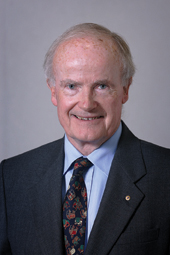 Professor
Richard Smallwood was the inaugural Chair of the National Blood
Authority Board. He currently chairs the Victorian Ministerial
Taskforce for Cancer, is Deputy President of the Australian Medical
Council, as well as chairing the Council's Specialist Education
Accreditation Committee, and is Deputy Chair of the Bio21
Scientific Advisory Council.
Professor
Richard Smallwood was the inaugural Chair of the National Blood
Authority Board. He currently chairs the Victorian Ministerial
Taskforce for Cancer, is Deputy President of the Australian Medical
Council, as well as chairing the Council's Specialist Education
Accreditation Committee, and is Deputy Chair of the Bio21
Scientific Advisory Council.
Professor Smallwood has had a distinguished career in medicine, including as the Chief Medical Officer for the Australian Government Department of Health and Ageing.
He has also held the roles of Vice-President of the World Health Assembly in Geneva, member of the Australian Health Ministers' Advisory Council, Chair of the National Health Information Advisory Council and Chair of the National Health Priority Action Council.
As Professor of Medicine with the University of Melbourne, Professor Smallwood was Head of the Department of Medicine, Chairman of the Division of Medicine at the Austin and Repatriation Medical Centre and Director of Gastroenterology at the centre.
In addition to his extensive Australian and international clinical and research experience, Professor Smallwood has a longstanding association with the National Health and Medical Research Council, was Chair of Council from 1994 to1997 and was President of the Royal Australian Council of Physicians from 1996 to 1998.
Professor Smallwood held the position of Chair of the National Blood Authority Board from the Board's inauguration in 2003 until May 2007, when his term concluded. He is currently the Chair of the Clinical Advisory Council.
Mr Ken Barker, Financial Expert
 Mr Ken Barker
is currently Chief Finance Officer, New South Wales Health, where
he is responsible for financial management policy and business
management services. He has an extensive understanding of insurance
risk management, taxation, benchmarking of public hospital support
services and independent financial assessment of
public–private sector initiatives.
Mr Ken Barker
is currently Chief Finance Officer, New South Wales Health, where
he is responsible for financial management policy and business
management services. He has an extensive understanding of insurance
risk management, taxation, benchmarking of public hospital support
services and independent financial assessment of
public–private sector initiatives.
Mr Barker is a member of the New South Wales State Contracts Control Board, Chair of the New South Wales Treasury Managed Fund Advisory Board and Chair of AusHealth International. He also chairs the National Blood Authority's Audit Committee and the National Indemnity Reference Group.
He was appointed to the National Blood Authority Board in 2003 and reappointed in 2007. Mr Barker brings to the National Blood Authority Board an extensive understanding of public sector financial management and an intimate knowledge of the health sector and the nature of Australian Government and state financial arrangements.
Dr Chris Brook, Former State/Territory Representative
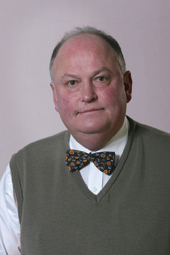 Dr Chris
Brook is the Executive Director, Rural and Regional Health and Aged
Care Services for the Victorian Department of Human Services. This
role carries operational responsibility for all rural and regional
health and aged care services, and state-wide program
responsibility for aged care, public health, alcohol and drugs,
primary and community health, dental health, rural and
regional-specific program matters, and quality and safety across
all Victorian public hospitals.
Dr Chris
Brook is the Executive Director, Rural and Regional Health and Aged
Care Services for the Victorian Department of Human Services. This
role carries operational responsibility for all rural and regional
health and aged care services, and state-wide program
responsibility for aged care, public health, alcohol and drugs,
primary and community health, dental health, rural and
regional-specific program matters, and quality and safety across
all Victorian public hospitals.
Dr Brook's original postgraduate training was as a specialist physician but he subsequently gained qualifications in public health medicine and in medical administration.
Dr Brook concluded his term as a member of the National Blood Authority Board in May 2007. He is currently a member of the Jurisdictional Blood Committee and the National Health Development Principal Committee and chairs the Population Health Information Development Committee. He is an honorary life member of the International Society for Quality in Health Care and a Fellow of the Victorian division of the Institute of Public Administration Australia.
Mr Rob Christie, Community Representative
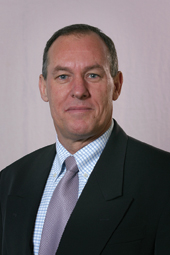 Mr Rob
Christie has a long history of community service and experience as
a health consumer representative in Australia on blood and blood
product issues and the needs of patients and families with bleeding
disorders. He is a past President of Haemophilia Foundation
Australia and Haemophilia Foundation South Australia.
Mr Rob
Christie has a long history of community service and experience as
a health consumer representative in Australia on blood and blood
product issues and the needs of patients and families with bleeding
disorders. He is a past President of Haemophilia Foundation
Australia and Haemophilia Foundation South Australia.
He is the current Vice-President, Finance, for the World Federation of Hemophilia.
Mr Christie has been a member of South Australian blood safety committees as a patient advocate and representative for many years. Mr Christie has strong business and management experience in the agricultural sector.
He was appointed community representative in May 2007.
Associate Professor David Cooper, Public Health Expert
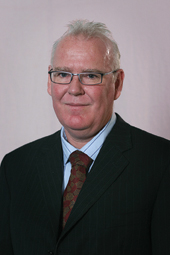 Associate
Professor David Cooper is the Foundation Chair of Disaster Response
and Preparedness in the Menzies School of Health Research at
Charles Darwin University, and the National Critical Care and
Trauma Response Centre in Royal Darwin Hospital.
Associate
Professor David Cooper is the Foundation Chair of Disaster Response
and Preparedness in the Menzies School of Health Research at
Charles Darwin University, and the National Critical Care and
Trauma Response Centre in Royal Darwin Hospital.
In this role, Associate Professor Cooper is responsible for developing Australia's front-line disaster capability as well as leading a national research agenda and curriculum in health emergency management.
Associate Professor Cooper is an emergency physician by clinical training (a Fellow of the Australian College for Emergency Medicine) and holds a masters degree in management and business administration from Macquarie University.
Prior to his current position, Associate Professor Cooper was the Director of the New South Wales Health Counter Disaster Unit, where he was also the state's Disaster Medical Controller. Associate Professor Cooper is also a member of the Australian Health Protection Committee and was responsible for the development of the Australian Mass Casualty Burn Disaster Plan (AUSBURN plan).
Associate Professor Cooper was appointed public health expert in May 2007.
Mr Philip Davies, Former Australian Government Representative
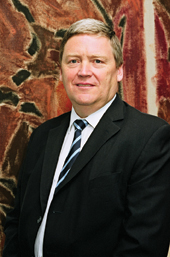 Mr Philip
Davies joined the Australian Government Department of Health and
Ageing as a Deputy Secretary in 2002 and brings to the role more
than 25 years' international experience in health-care policy
and management. As a member of the department's executive, he
has had responsibility for policy development and program
management in a variety of areas, including medical and
pharmaceutical benefits, health workforce, e-health, rural health,
Aboriginal and Torres Strait Islander health and private health
insurance. He is a member of the Executive Committee of the Health
Services Research Association of Australia and New Zealand and
chaired the Australian Government's Gene Technology Standing
Committee.
Mr Philip
Davies joined the Australian Government Department of Health and
Ageing as a Deputy Secretary in 2002 and brings to the role more
than 25 years' international experience in health-care policy
and management. As a member of the department's executive, he
has had responsibility for policy development and program
management in a variety of areas, including medical and
pharmaceutical benefits, health workforce, e-health, rural health,
Aboriginal and Torres Strait Islander health and private health
insurance. He is a member of the Executive Committee of the Health
Services Research Association of Australia and New Zealand and
chaired the Australian Government's Gene Technology Standing
Committee.
Mr Davies has qualifications in mathematics and holds a masters degree in management science and operational research. He is also an Honorary Fellow of the Health Services Research Centre at the Victoria University of Wellington, New Zealand, and has provided consultancy advice on health policy to the World Bank and World Health Organization (WHO).
Mr Davies has worked as a health-care management consultant and a partner with Coopers & Lybrand (now PricewaterhouseCoopers). Mr Davies was the Deputy Director-General of the New Zealand Ministry of Health and worked as a senior health economist with the WHO.
Mr Davies was appointed Australian Government representative in November 2003 and completed his appointment on the Board in November 2006.
Mr David Kalisch, Australian Government Representative
 Mr David
Kalisch was appointed Deputy Secretary in the Department of Health
and Ageing in June 2006. He is a member of the department's
executive, with responsibility for the Portfolio Strategies
Division, the Acute Care Division, the Mental Health and Workforce
Division and the South Australian and Western Australian state
offices of the department.
Mr David
Kalisch was appointed Deputy Secretary in the Department of Health
and Ageing in June 2006. He is a member of the department's
executive, with responsibility for the Portfolio Strategies
Division, the Acute Care Division, the Mental Health and Workforce
Division and the South Australian and Western Australian state
offices of the department.
Mr Kalisch is an economist who has worked in a range of social policy areas of government since the early 1980s. Since the early 1990s, he has been in the Australian Government senior executive service in the departments of Social Security, Prime Minister and Cabinet, Family and Community Services and now Health and Ageing.
Apart from these appointments, he was principal adviser to a former Minister for Social Security and has worked at the Organisation for Economic Co-operation and Development.
Mr Kalisch was appointed Australian Government representative on the Board in November 2006 and his appointment was reconfirmed in 2007.
Dr Peter Lewis-Hughes, State/Territory Representative
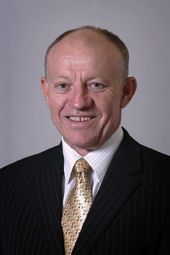 Dr
Peter Lewis-Hughes is a health-care manager with extensive
experience at both the Australian Government and state levels. His
particular strength is in strategic and business planning for
laboratory services and he has been involved in the implementation
of a state-wide laboratory service for Queensland Health since
1995.
Dr
Peter Lewis-Hughes is a health-care manager with extensive
experience at both the Australian Government and state levels. His
particular strength is in strategic and business planning for
laboratory services and he has been involved in the implementation
of a state-wide laboratory service for Queensland Health since
1995.
His career has involved performing many senior roles, including Executive Director of Australian Capital Territory Pathology, Queensland Business Manager for the Commonwealth Medical Service and Director of Strategic Management at the Greenslopes Repatriation Hospital.
He brings to the Board strong experience in the integration and networking of information systems in the area of laboratory reporting, as well as experience in finance and human resources management.
Dr Lewis-Hughes was appointed public health expert in 2003 and appointed state/territory representative in 2007.
Mr Russell McGowan, Community Representative
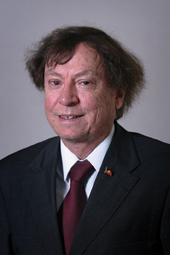 Mr
Russell McGowan was the Board's community representative and
brought a strong consumer perspective on blood services through
experiences as a bone marrow transplant survivor.
Mr
Russell McGowan was the Board's community representative and
brought a strong consumer perspective on blood services through
experiences as a bone marrow transplant survivor.
His experiences led to active involvement in the health-care consumer movement for more than a decade. He is President of the Health Care Consumers' Association of the ACT and has been a long-term member of several national boards, including the Australian Council on Healthcare Standards and the Consumers' Health Forum.
He is currently involved in the administration of health, education and sporting organisations in the community sector, having previously spent 20 years developing and delivering employment, education and training programs for Indigenous people.
Mr McGowan served as community representative from July 2003 until May 2007.
Mr Robin Michael, State/Territory Representative
 Mr Robin
Michael is a health-care professional with 28 years'
experience. He is currently General Manager of the Royal Darwin
Hospital, Northern Territory. Mr Michael has qualifications in pure
mathematics and statistics, computing science and public health. He
has managed public and private health services and worked in the
government sector. His experience ranges across management and
consulting where he has been a director of KPMG, a partner in
Coopers & Lybrand (now PricewaterhouseCoopers) and a partner in
Deloitte Consulting. He has worked in both Australia and New
Zealand in healthcare and enterprise resource planning
implementation.
Mr Robin
Michael is a health-care professional with 28 years'
experience. He is currently General Manager of the Royal Darwin
Hospital, Northern Territory. Mr Michael has qualifications in pure
mathematics and statistics, computing science and public health. He
has managed public and private health services and worked in the
government sector. His experience ranges across management and
consulting where he has been a director of KPMG, a partner in
Coopers & Lybrand (now PricewaterhouseCoopers) and a partner in
Deloitte Consulting. He has worked in both Australia and New
Zealand in healthcare and enterprise resource planning
implementation.
Mr Michael was appointed to the Board in 2005 and his appointment was reconfirmed in 2007.
The first four years
A reflection from Professor Smallwood—National Blood Authority inaugural Board Chair
In May 2007, with a sense of considerable achievement and immense confidence for the future of the blood sector, I concluded my term as inaugural Chair of the National Blood Authority Board. From its inception, the National Blood Authority Board strived to provide the General Manager, Dr Alison Turner, with considered and appropriate advice, and the Board has seen this materialise into significant gains in the blood sector.
Being the Chair of the Board of a new organisation is a very challenging task. The establishment of the National Blood Authority was the culmination of the work of all Australian governments to assess the recommendations of the Review of the Australian Blood Banking and Plasma Product Sector (Stephen review). To implement the recommendations of the review, the National Blood Agreement was signed, which paved the way for an innovative and refreshing approach by governments to address cost, consistency, clinical and risk issues for the blood sector.
Significant and challenging tasks ranged from finding appropriate accommodation and staff—including the General Manager—to organising the logistics of the Jurisdictional Blood Committee to guide the policy and work of the National Blood Authority and the establishment of the first National Supply Plan and Budget. When everything is new and there is no history, there is no capacity to check, 'What did we do last time?' and there are always many different ideas from which to choose.
As an advisory rather than a governance board, we had to trial and modify what we did and how we considered matters. This was to ensure we operated in the way governments intended and provided the best support possible to the General Manager. Within a very short period of time, the General Manager asked the National Blood Authority Board to focus on core issues surrounding contract negotiation strategies and tactics; corporate and planning priorities, including governance structures and processes; the establishment and operation of the National Blood Authority Audit Committee; and liaison with stakeholders to determine their views and aspirations.
Following these activities in the first year, the Board was engaged by the General Manager to examine the core strategic challenges facing the National Blood Authority in its second year. In 2004–05, these included the timing and handling of various aspects of negotiations with CSL Limited, options for the management of the delay in reaching agreement with the Australian Red Cross Society on the Deed of Agreement, the scope and nature of a defined blood products tender, and the first formal analysis of appropriate and effective risk mitigation strategies for the sector as a whole.
In 2005–06, as a result of additional funding provided, the General Manager sought the Board's view on the planning, timing and scope of, and the approach to, working with the sector on safety, quality and the appropriate use of blood and blood-related products. Our involvement in this area was always a core expectation of the National Blood Agreement and the expectation of clinical stakeholders, and it is an area that the National Blood Authority is now focusing on extensively. The Board also provided advice on the establishment of a national haemovigilance system, the draft Criteria for the Clinical Use of Intravenous Immunoglobulin in Australia and the establishment of clinical advisory mechanisms.
I am pleased that the National Blood Authority now has solid foundations for professional contract negotiation and procurement procedures, and is now recognised as having achieved high-quality outcomes for the sector.
The National Blood Authority has now commenced work to promote the appropriate use of blood and blood-related products and has the opportunity to create frameworks and data and information systems that can see the requirements of the National Blood Agreement continue to be achieved.
These systems will not only improve the cost-effectiveness of blood and blood-related products for all Australians; they will also provide enhanced patient safety.
I am satisfied that the importance of fostering productive partnerships with all stakeholders, professionalism in tendering and contracting, the need for thorough market and risk analysis, knowledge and hands-on understanding of all facets of the blood sector, and the need to balance the requirements of stakeholders are embedded in the work of the National Blood Authority.
I am sure that the new National Blood Authority Board will continue to reinforce these.
I leave the Board confident that it has played a crucial role in shaping, guiding and informing the nature, timing and scope of projects and priorities implemented by the National Blood Authority. Key to its success has been its unique ability to draw informally on the experiences and expert knowledge of individual Board members. I express my thanks to those members, Dr Chris Brook, Mr Ken Barker, Dr Peter Lewis-Hughes, Mr Philip Davies, Mr David Kalisch and Mr Russell McGowan, who gave their time and energy to ensure the success of the Board and the National Blood Authority. It has been my pleasure to be Chair of the Board.
The National Blood Authority now moves forward noting that it has already made significant achievements in the sector. The dedication of the General Manager and her staff will ensure the National Blood Authority achieves its goal of managing and securing Australia's blood supply.

Professor Richard Smallwood
Chair of the National Blood Authority Board
1 July 2003 to 13 May 2007

